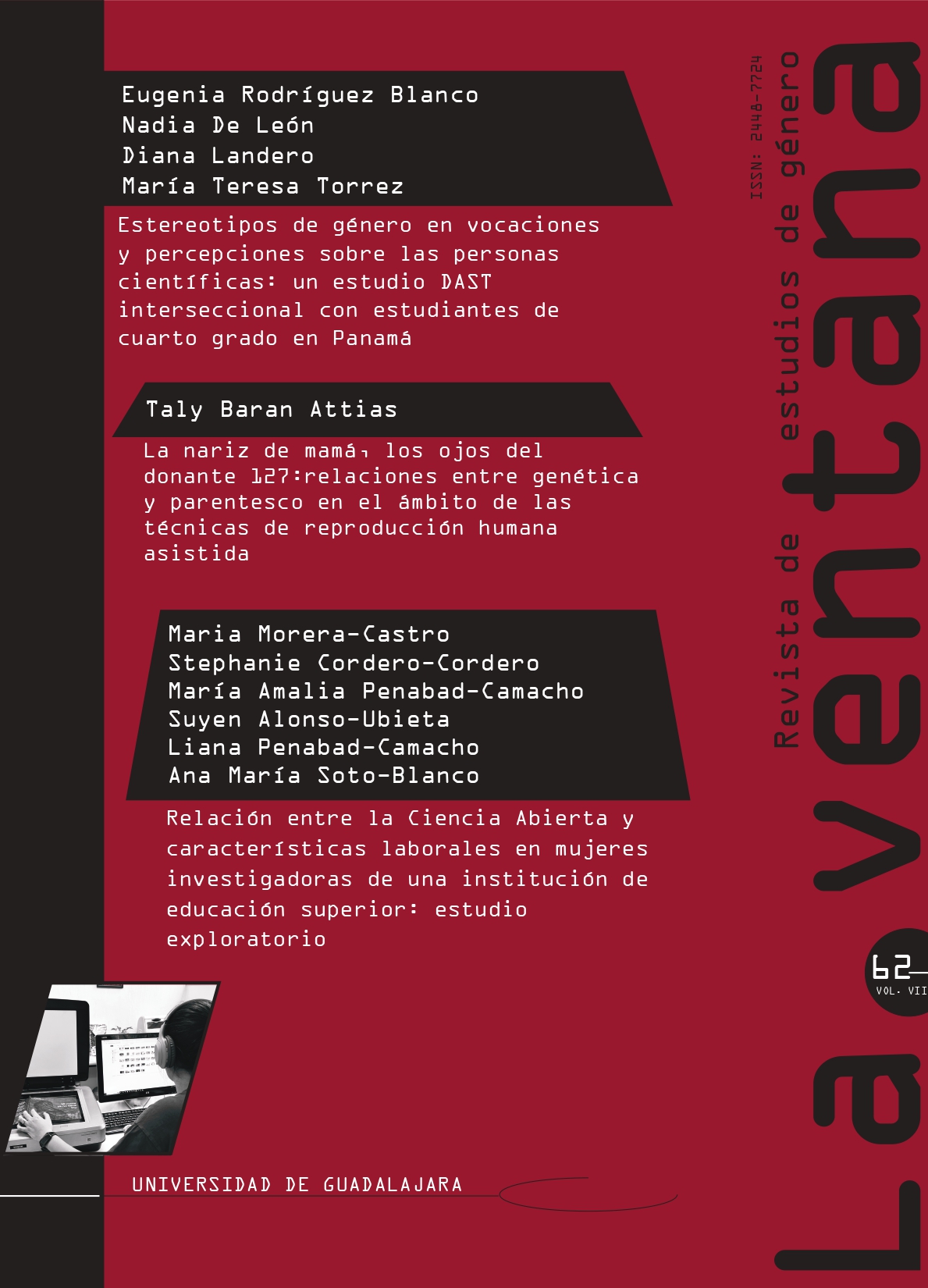Factores causales y variables psicológicas en la masculinidad tradicional: una revisión sistemática PRISMA
Resumen
La masculinidad ha sido objeto de un creciente interés en el ámbito de la psicología, debido a su impacto significativo en diversos aspectos de la vida de los hombres, la cual abarca una serie de características, conductas y roles que se relacionan con el concepto de hombría dentro de una sociedad específica. Así, en los últimos años, la investigación ha comenzado a explorar diferentes factores y variables que sustentan y perpetúan la masculinidad tradicional. Por lo tanto, el objetivo de esta revisión sistemática es identificar factores causales y las variables psicológicas asociadas con la masculinidad tradicional. Se llevó a cabo una búsqueda bibliográfica tomando en cuenta la declaración PRISMA 2020 de artículos sobre factores causales y variables psicológicas asociadas con la masculinidad tradicional. Se empleó el método de búsqueda en las bases de datos: Science Direct, Scopus, Web of Science, PubMed, PsyINFO y ProQuest, la inclusión de documentos se limitó al período comprendido entre 2014 y 2024. Al final, fueron seleccionados 12 artículos para ser incluidos en la revisión por cumplir completamente con todos los criterios de inclusión. Los resultados relevantes fueron identificar factores causales y variables psicológicas relacionadas con la masculinidad tradicional como: apoyo de amigos, búsqueda de ayuda, depresión, agresión, alexitimia, supresión, narcisismo, coerción e ideación suicida. Como conclusión, este estudio aporta una visión integral de cómo diferentes factores contribuyen a la construcción de la masculinidad tradicional, ofreciendo una base para futuras investigaciones e intervenciones.Descargas
Citas
ARANDJELOVIĆ, O. (2023). Masculinity and the questions of “Is” and “Ought”: Revisiting the definition of the notion of masculinity itself. Sexes, 4(4), 448-461. https://doi.org/10.3390/sexes4040029
AZAMAR, C. (2015). Masculinidades: algunas notas sobre sus crisis, retos y perspectivas. Revista Fuentes Humanísticas, 27(51), 57-73. https://fuenteshumanisticas.azc.uam.mx/index.php/rfh/article/view/31
CLARK, L., HUDSON, J., RAPEE, R. Y GRASBY, K. (2020). Investigating the impact of masculinity on the relationship between anxiety specific mental health literacy and mental health help-seeking in adolescent males. Journal of Anxiety Disorders, 76, 102292. https://doi.org/10.1016/j.janxdis.2020.102292
COLEMAN, D. (2015). Traditional Masculinity as a Risk Factor for Suicidal Ideation: Cross-Sectional and Prospective Evidence from a Study of Young Adults. Archives of Suicide Research, 19(3), 366-384. https://doi.org/10.1080/13811118.2014.957453
COLEMAN-KIRUMBA, L., CORNISH, M., HORTON, A. Y ALVAREZ, J. (2023). Experiences of Black Men: Forms of Masculinity and Effects on Psychological Help-Seeking Variables. Journal of Black Psychology, 49(1), 32-57. https://doi.org/10.1177/00957984221098122
CONNELL, R. W. (1987). Gender and power: Society, the person, and sexual politics. Stanford University Press.
CONNELL, R. Y MESSERSCHMIDT, J. (2005). Hegemonic Masculinity: Rethinking the Concept. Gender and Society, 19(6), 829-859. https://doi.org/10.1177/0891243205278639
EXNER-CORTENS, D., WRIGHT, A., CLAUSSEN, C. Y TRUSCOTT, E. (2021). A Systematic Review of Adolescent Masculinities and Associations with Internalizing Behavior Problems and Social Support. American Journal of Community Psychology. https://doi.org/10.1002/ajcp.12492
GENUCHI, M. C. (2018). The Role of Masculinity and Depressive Symptoms in Predicting Suicidal Ideation in Homeless Men. Archives of Suicide Research, 23(2), 289-311. https://doi.org/10.1080/13811118.2018.1428705
JEWKES, R. Y MORRELL, R. (2018). Hegemonic Masculinity, Violence, and Gender Equality: Using Latent Class Analysis to Investigate the Origins and Correlates of Differences between Men. Men and Masculinities, 21(4), 547-571. https://doi.org/10.1177/1097184X17696171
KAZDIN, A. (2021). Research design in clinical psychology. Cambridge University Press.
KERLINGER, F. Y LEE, H. (2000). Foundations of behavioral research. Holt, Rinehart and Winston.
KIM, S. Y YU, S. (2023). Men's mental health and interventions tailored to masculinity: a scoping review. Journal of Men's Health, 19(11), 1-10. https://www.jomh.org/articles/10.22514/jomh.2023.111
KING, T. L., SHIELDS, M., SOJO, V., DARAGANOVA, G., CURRIER, D., O'NEIL, A., KING, K. Y MILNER, A. (2020). Expressions of masculinity and associations with suicidal ideation among young males. BMC Psychiatry, 20(1), 228. https://doi.org/10.1186/s12888-020-2475-y
KUPERS, T. A. (2005). Toxic masculinity as a barrier to mental health treatment in prison. Journal of Clinical Psychology, 61(6), 713-724. https://doi.org/10.1002/jclp.20105
LEVANT, R., STEFANOV, D., RANKIN, T., HALTER, M., MELLINGER, C. Y WILLIAMS, C. (2013). Moderated path analysis of the relationships between masculinity and men’s attitudes toward seeking psychological help. Journal of Counseling Psychology, 60(3), 392-406. https://doi.org/10.1037/a0033014
LIAQAT, H., MALIK, T. A. Y BILAL, A. (2020). Impact of Masculinity and Normative Male Alexithymia on Interpersonal Difficulties in Young Adult Males. Mediterranean Journal of Clinical Psychology, 8(2). https://doi.org/10.6092/2282-1619/mjcp-2488
LOGOZ, F., EGGENBERGER, L., KOMLENAC, N., SCHNEEBERGER, M., EHLERT, U. Y WALTHER, A. (2023). How do traditional masculinity ideologies and emotional competence relate to aggression and physical domestic violence in cisgender men? Frontiers in Psychology, 14. https://doi.org/10.3389/fpsyg.2023.1100114
MALONDA-VIDAL, E., SAMPER-GARCÍA, P., LLORCA-MESTRE, A., MUÑOZ-NAVARRO, R. Y MESTRE-ESCRIVÁ, V. (2021). Traditional Masculinity and Aggression in Adolescence: Its Relationship with Emotional Processes. International Journal of Environmental Research and Public Health, 18(18), 9802. https://doi.org/10.3390/ijerph18189802
ORGANIZACIÓN PANAMERICANA DE LA SALUD (2019). Masculinidades y salud en la Región de las Américas, Resumen. https://iris.paho.org/handle/10665.2/51667
PAGE, M. J., MCKENZIE, J. E., BOSSUYT, P. M., BOUTRON, I., HOFFMANN, T. C., MULROW, C. D., SHAMSEER, L., TETZLAFF, J. M., AKL, E. A., BRENNAN, S. E., CHOU, R., GLANVILLE, J., GRIMSHAW, J. M., HRÓBJARTSSON, A., LALU, M. M., LI, T., LODER, E. W., MAYO-WILSON, E., MCDONALD, S., … MOHER, D. (2021). The PRISMA 2020 statement: An updated guideline for reporting systematic reviews. BMJ, 372(71). https://doi.org/10.1136/bmj.n71
PÉREZ-MARTÍNEZ, V. (2024). Violencia de Género y de pareja en adolescentes: El papel del machismo, la aceptación de la violencia y las masculinidades en la salud [Tesis doctoral]. Universidad de Alicante. http://hdl.handle.net/10045/141140
ROGERS, A. A., DELAY, D. Y MARTIN, C. L. (2017). Traditional Masculinity During the Middle School Transition: Associations with Depressive Symptoms and Academic Engagement. Journal of Youth and Adolescence, 46, 709-724. https://doi.org/10.1007/s10964-016-0545-8
ROGERS, A., HA, T., BYON, J. Y THOMAS, C. (2020). Masculine gender-role adherence indicates conflict resolution patterns in heterosexual adolescent couples: A dyadic, observational study. Journal of Adolescence, 79(1), 112-121. https://doi.org/10.1016/j.adolescence.2020.01.004
SALAS CALVO, J. (2008). La psicología, la masculinidad y el trabajo con hombres. Revista Costarricense de Psicología, 27(40), 53-65. https://www.redalyc.org/articulo.oa?id=476748705002
VAN DOORN, G., DYE, J. Y DE GRACIA, M. R. (2021). Daddy issues: Friends rather than fathers influence adult men’s hegemonic masculinity. Personality and Individual Differences, 171, 110467. https://doi.org/10.1016/j.paid.2020.110467
WADDELL, C., VAN DOORN, G., MARCH, E. Y GRIEVE, R. (2020). Dominance or deceit: The role of the Dark Triad and hegemonic masculinity in emotional manipulation. Personality and Individual Differences, 166, 110160. https://doi.org/10.1016/j.paid.2020.110160













